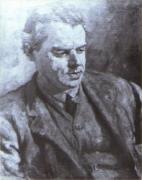|
|
||||||||||||||||||||||||
 |
Featured person
Recently added |
Monsignor Liam Mac an tSagairt (1928 - 2010): |
||||||||||||||||||||||
Liam McEntegart (the Anglicisation of his name) was a Roman Catholic cleric who had a special concern for education and particularly the Irish language. He was also an enthusiastic and very knowledgeable historian of the region of north-east Ireland known as Oriel, which covers modern-day Counties Louth (in Leinster province, Republic of Ireland) and the Ulster Counties Armagh (present-day Northern Ireland) and Monaghan (Republic of Ireland. His parochial appointments were all in County Tyrone.
Mac an tSagairt was an Oriel native, to be precise, he was born in Dundalk, eldest of five children of Bernard McEntegart and Isabella (nee McHugh). He was educated at Dundalk CBS, (the Scoil na mBráithre, or Christian Brothers school), St Patrick’s College, Armagh and then Maynooth, where graduated in Celtic Studies. He was ordained in 1953 and appointed a teacher of Irish, Latin and English at St Patrick’s College, Dungannon County Tyrone. He was appointed Principal in 1961 and in 1984 left the teaching vocation on his appointment as parish priest in Coalisland and subsequently in Dungannon. In this latter appointment he was vicar general of the archdiocese of Armagh (that is, the senior deputy to the Archbishop). While Principal of St Patrick’s he coined the institution’s motto, recta sapere (which translates as “to relish the proper thing” or more vernacularly “to get your priorities right”). He also presided over expansion of the school buildings. He was always active in promoting education in general, ont least in his work for the for Catholic Maintained Schools. While vicar general he served under three Cardinal Archbishops of Armagh, Tomás Ó Fiaich (himself a noted scholar of the Irish language), Cahal Daly and Sean Brady. It was said of him that he well fulfilled all the requirements officially required of incumbents of this role – except that he declined a tonsure.
He was throughout his life also an assiduous promoter of the Irish language. He served as President of Colaiste Aoidh Mhic Bricne in Teelin, County Donegal, a summer school teaching Irish through a variety of activities, indoor and outdoor, with the provision “Tá riail na Gaeilge i bhfeidhm” – Irish language only. He was for two terms President of Comhaltas Uladh, the Ulster branch of the Gaelic League (or in Irish, Conradh na Gaeilge). He was also chairman of the editorial committee of that body’s publication An tUltach; he served on the committee of Féile Drámaíochta Dhún Geanainn, the Irish-language drama festival in Dungannon, where he often directed productions. One of these had as its theme the accidental arrival of an Orangeman in the Irish-speaking “Land of Youth”, Thompson in Tír na nÓg, and the interaction between himself and the inhabitants of what was to him a strange land. He was active in Éigse Oirialla, dedicated to the culture of his native Oriel region, and which published his book on Father Lorcan O Muiri, another promoter of the Irish language.
The sensibilities and controversies to which the Troubles could give rise affected him directly on one occasion when he officiated at the funeral of two IRA members who had been killed in an operation involving undercover members of the security forces. Mac an tSagairt permitted the coffins into the church covered with the Irish national flag, but refused to allow paramilitary trappings and in his oration was critical of the activities of the deceased as well as those of the soldiers who killed them. A number of mourners walked out of the church.
Mac an tSagairt was still on the Dungannon Festival Committee at his death. On October 6, 2005 he had been awarded an honorary Doctorate of Letters by the University of Ulster. At the ceremony, he was presented by Professor Séamus Mac Mathúna, who stated:
“Monsignor Mac an tSagairt neither actively seeks the limelight nor expects any accolades. He has, however, in a quiet, dignified and efficient manner, achieved over many years much to celebrate in the fields of education, religion and Irish culture and he is truly deserving of the honour bestowed upon him.”
| Born: | 17 October 1928 |
| Died: | 22 August 2010 |
| Richard Froggatt |
| Bibliography: Obituary, The Irish Times; www.parishofdungannon.com; www.concos.ie; (homily by Bishop Gerard Clifford, 24.8.2010); www.arts.ulster.ac.uk (Monsignor Liam Mac An tSagairt; Address by Professor Séamus Mac Mathúna |


Home | Our Policies | Plaques | Browse | Search | Sponsors | Links | Help | Contact
Privacy & Disclaimer | Cookie Policy | Site Map | Website Design By K-Point
© 2024 Ulster History Circle









